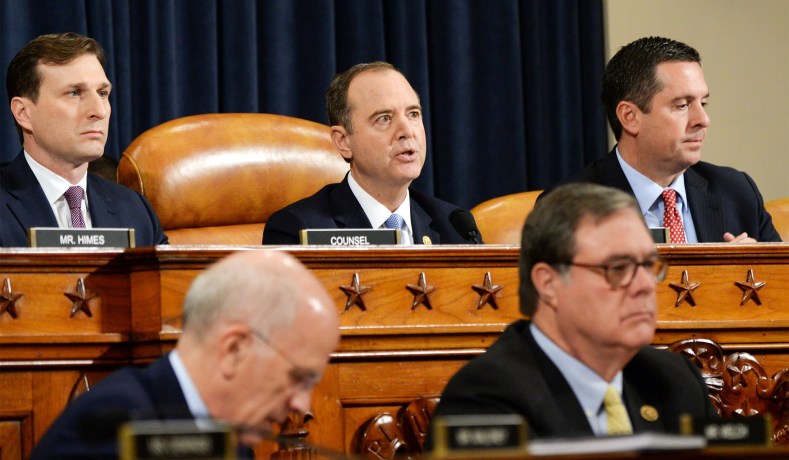There’s a rich menu of political and gotcha goodies to choose from if you watch the impeachment hearings as entertainment. If you watch as a lawyer there are emerging battles that are more consequential. It isn’t yet clear how the varying legal positions of Democrats and Republicans will affect the practical results. But both the Nixon and Clinton impeachments ultimately rested on both factual evidence and persuasive legal theories. Eventually, both will emerge in the Trump impeachment.
Democrats have recently modified their vocabulary and their legal arguments. They began to use the language of “bribery” and abandoned the less pointed “quid pro quo” or “abuse of power” as the heart of the impeachable Trump offenses. This fits nicely into the words of the Constitution where “bribery” is specifically mentioned. References to federal bribery statues followed: “the gift, offer, promise or solicitation of a thing of value in order to influence a public official to perform or omit an official act.”
It’s an important shift. It simplifies the public argument but it also opens legal complications that both Democrats and Republicans need to figure out.
Democrats have produced evidence of two separate bribery plots. First, in exchange for the Biden investigations, Trump would hold a White House meeting with Zelensky. The evidence seems clear and unchallengeable. Second, in exchange for the Biden investigations Trump would authorize military aid. The evidence here is circumstantial and rests on witness assertions of a lack of an alternative explanation.
The distinction matters. Impeaching a president for bribery over a meeting is legally suspect. Impeaching for holding up aid is not suspect.
This goes to the question of what constitutes “an official act.” In McConnell v US, a seminal case on a related statute, the Supreme Court overturned the conviction of the Governor of Virginia because setting up a meeting is not legally offensive. “Setting up a meeting, calling another public official or hosting an event does not, standing alone, qualify as an ‘official act’,” said Chief Justice Roberts.
No such limitation would apply to a decision to hold up congressionally approved military aid. That is an official act by any standard.
Democrats have done admirably in painting a persuasive factual picture of a president anxious to use his official position to achieve political ends. But, having shifted to a narrow legal theory, they need to pin down the legal elements of bribery. If they can produce definitive evidence that connects the Biden investigations to impoundment of military aid they are in a much stronger position. Interestingly, it’s not the hearing witnesses who are central to this issue. It’s the Mulvaney admission which opens the door for improved evidence, if Trump allows it to be produced.
Republicans also face substantial legal problems based on a public strategy that denies any suspect behavior by Trump. They have abandoned arguments that Trump’s behavior is repugnant and unethical but not impeachable. Democrats effectively protected Bill Clinton by admitting the obvious dishonesty and wrongness of his behavior but denying it amounted to an impeachable offense. Trump is, so far, unwilling to budge and his minions troop along dutifully. They are stuck with an all-or-nothing defense just when nuance and narrow analysis is needed.
On a related legal matter Democrats have let Republicans mischaracterize the elements of a bribery charge. The Republicans repeat that the aid was eventually delivered and that Trump eventually met with Zelensky, therefore no bribery. In fact, the bribery statute prohibits “solicitation” of a bribe whether or not the actual exchange took place. Democrats have let that argument go unchallenged.
These competing legal weaknesses may become relevant at a Senate trial, if Senators decide to treat it as a serious legal proceeding. Undecided Senators, if they exist, should be concerned about adequate evidence and persuasive legal argument. And it may nourish the likely attempts to craft some sort of compromise resolution of the impeachment effort. Inevitably, there will be suggestions of censure or other actions short of actual impeachment or conviction. The parties will evaluate their political and legal positions at that time as well.
For now both parties are facing the limitations of their own tactics and theories. Democrats have more to do as they focus on a narrow legal theory. Republicans have the thankless job of pretending that the President’s awful behavior is “perfect.” So far there’s little appetite for inquiry into the essentials of an impeachment inquiry. I suspect that that will change.
Richard Brodsky is an attorney and a former Member of the New York State Assembly.





0 Comments